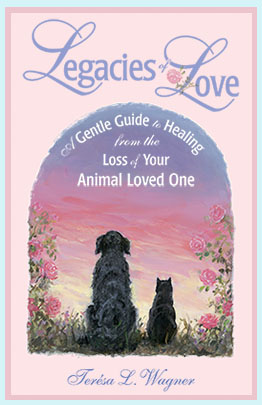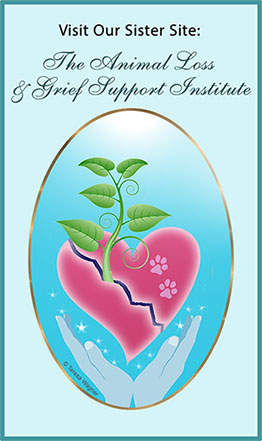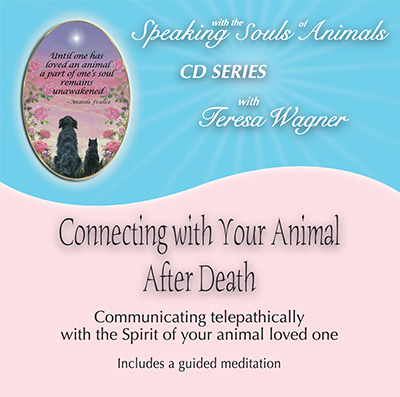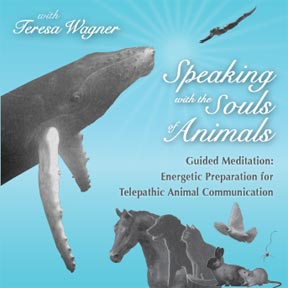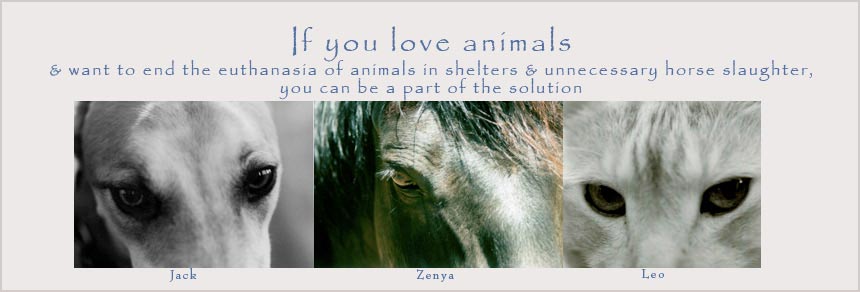Animals Grieve Too:
Helping Animals Through Loss, Grief & Rehoming;
Creating a Legacy of Support for Animals We Love
For When We Are No Longer With Them
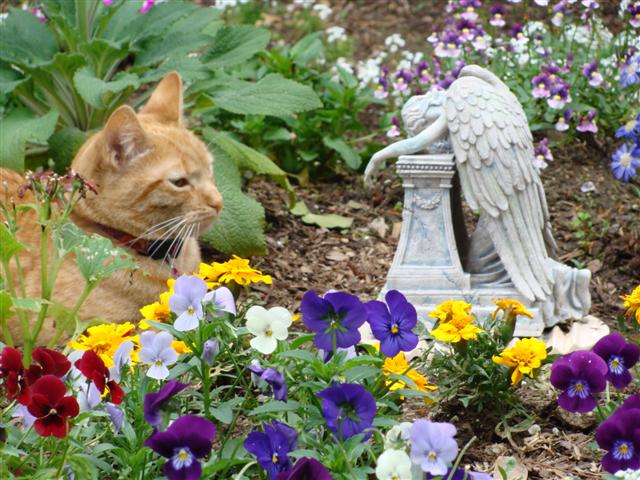
|
LENGTH: |
A 2-part teleclass, totalling 5 total hours |
|---|---|
|
OFFERED |
This is an on-demand teleclass to take anytime, at your convenience. |
|
COST: |
$125 includes: |
|
|
Click here to purchase This is a required class in the Animal Loss and Grief Support Training and Certification Program. If you wish to take this class for credit in the program please see Certification Requirements and This email address is being protected from spambots. You need JavaScript enabled to view it.. |
|
INSTRUCTOR:
|
Teresa Wagner, M.S., Program Founder Anyone who would like to:
• Better understand how animals grieve, the circumstances that often trigger grief and grief related stress to animals • Learn specific ways to help animals cope with and heal through loss, grief and starting over when they have lost their families, their friends or their home. • Examine a multitude of ways we can prevent and minimize the grief and grief-related stress and trauma of companion animals and all animals via our everyday lifestyle decisions • Learn how to leave a legacy of physical guardianship and emotional support for your animals’ care if you die or are no longer able to care for them If you love animals, and if you believe in the power of love between humans and animals to heal, you will enjoy this class! If you want to be well prepared to help animals you love with their grief and grief-related stress or trauma, you'll learn how in this class. The class is also relevant for those in grief support roles who want to better understand animal grief and to support clients with grieving animals. Click here to read comments from class participants
|
CONTENT AND PURPOSE:
The purpose of this class is to help humans become more aware of and sensitive to the very real grief that animals experience, and how we can plan for and provide support for their grief-related stress and trauma in various situations of loss and transition, including rehoming. Though this class is for human participants and human learning, it is ultimately a class to serve the animals.
When I began my professional animal communication practice in 1991, I learned two things fairly quickly: that animals have the same emotional range as humans; and that they are each unique in the way they experience and express their emotions--just like humans. Anthropologists and scientists at times concede that some animals might grieve given observed behaviors, but they often speak of it in cool, unemotional terms. They seem reluctant to acknowledge that anything that cannot be proven in physically measurable terms could actually be real, and that somehow only animals with brains the size of human brains or larger may have such emotional capacities. In New Age circles, erroneous myths and assumptions abound that animals either don’t feel grief because "they all live in the moment and do not hold onto any emotions" or they get over it quickly, based on theories that animals are “more evolved” than humans and so they do not experience emotional suffering.
The idea that animals do not grieve or suffer from loss is usually circulated by people who don’t talk with animals. But when we do, when we have full, interactive conversations with animals who have experienced loss, carefully listening to their stories and being open to fully witness their pain, it is abundantly clear that they grieve. Sometimes their grief is so obvious from observation alone that only a tightly closed-hearted person would deny that their grief is real. There is no hierarchy amongst species regarding who grieves. All beings grieve. All we need do is listen to know this truth.
In this class we’ll discuss dozens of true stories of animals grieving--from elephants, whales, chimpanzees and snakes in the wild to dogs, cats, birds, horses, cows and goats living with humans. We’ll review specific ways to support animals who are grieving, whether it’s helping your own companion animals through the loss of a family member (animal or human), helping your adopted rescue animals cope and heal from their losses and grief from their past, wild animals grieving the loss of loved ones from natural disasters or from intentional human killing and from being kidnapped and forced to live in captivity. We’ll discuss ways in which we can anticipate and plan for potential grief and grief-related stress of our animal companions to help mitigate their stress and emotional pain. We'll also review ways in which we can help wild animals who are grieving even without being anywhere close to their physical location. Participants will have the opportunity to share stories of their own animals grieving which to be discussed during the class.
The outline of content covered in the class includes:
Acknowledging and understanding that animals grieve just as we do
- True stories of animal grief
- Viewing animals through the lens of biocentrism versus anthropocentrism
- Understanding that animals are individuals and each grieve differently and uniquely
- Prudence's story from Love Saves the Day
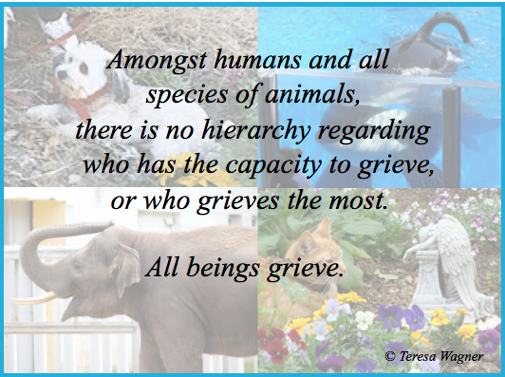
Increasing our awareness of typical circumstances in which animals experience grief and grief-related stress
- Death (i.e, of their humans, of beloved animal family members, companions, friends) Abandonment (i.e., at shelters, rescue groups, the streets, the countryside, left in a home or property humans have moved from, being given away)
- Family structure changes (i.e. divorce and separation, primary human brings new human into the family who does not like animals; primary human brings new human into the family and now prefers that human to the animal; human baby comes into the family and suddenly animal is no longer important or a priority)
- Housing and home base changes for companion animals
- Habitat loss for wild animals
- Temporary separation (i.e., humans on vacation, business trips, hospitalized) Being sold, often repeatedly, and treated as a commodity, not a living being whose needs count (i.e., some horses, show dogs and cats, captive animals in zoos and aquariums)
- Having one's babies taken away (i.e. in the dairy and other farmed animal industries, the cattle industry, horse breeding industry, the captive cetacean industry)
- Witnessing one's family member or loved one being killed (i.e. the cetacean slaughter industry, the food animal industry, a companion animals seeing a human killed)
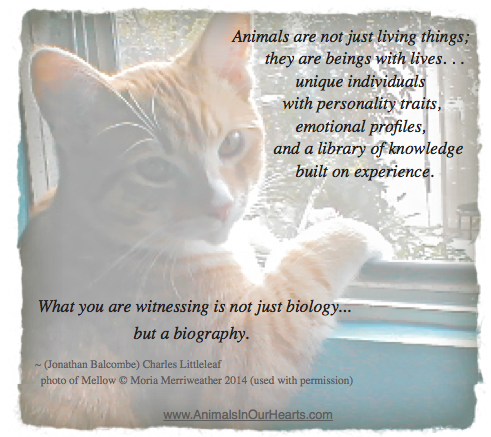
How we can help animals through loss, grief and starting over
- Be alert, be aware and acknowledge their loss
- Listen, listen, listen with empathy: Listen with your heart; Learn to talk with animals telepathically (or seek professional consultation when needed)
- Learn how to send calming and healing energy to any animal, in any location, at any time
- Provide other grief support healing resources such as flower essences, empathy, conversation and gestures of reassurance from the heart, hands, eyes, voice and energy healing
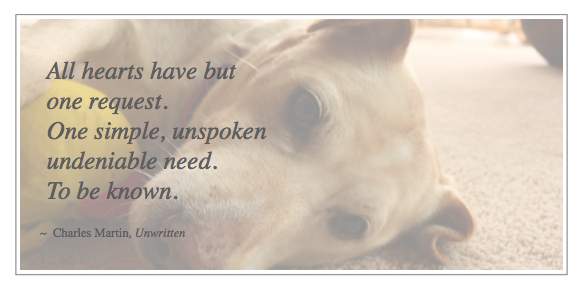
How we can prevent grief and grief-related stress for animals
- Anticipating and planning for potential changes in animal companions’ lives that cause grief and grief-related stress
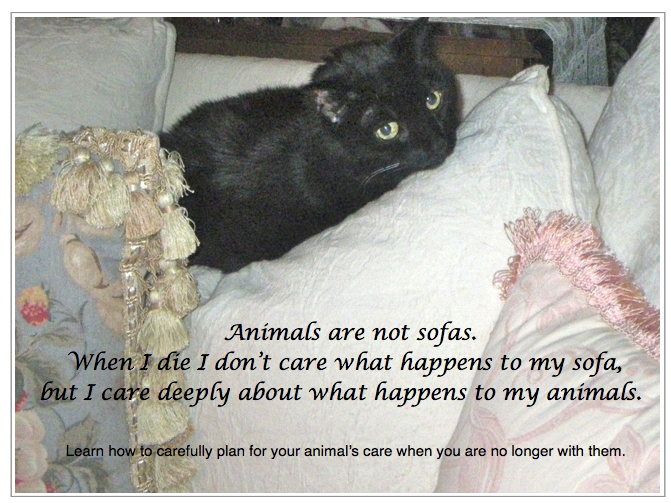
Creating a Legacy of Support for our animals' physical and emotional care if we die before they die, or if we are no longer able to take care of them
- Biggest Mistakes People Make Regarding Their Animals’ Care After Their Death or When Incapacitated
- How To Avoid These Mistakes
- FORM: What Do I Want for My Animal Loved Ones If I Die Before Them or Become Incapacitated and Can No Longer Be Their Guardian?
Physical Guardianship
- Considerations in choosing the best person(s) or organization as guardian for your animal
- Provide detailed information of your pet’s history, important care providers & daily routine so their guardian can care for your pet as you would
- FORM: My Pet’s History and Important Health and Care Information
Financial Support
- For food, healthcare, pet sitting/boarding, dog walkers, groomers, training and other expenses
Emotional Support
- Emotional needs and issues
- Emotional support I want my animal to receive
- FORM: Profile of my pet’s personality, behavior and routines
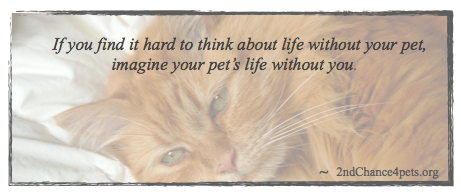
NOTE: Required reading for this class includes the book, Loves Save the Day by Gwen Cooper, New York Times Best Selling Author. The experiences and perspective of the cat in this book will be discussed and reviewed in the class.
http://www.amazon.com/Love-Saves-Day-A-Novel/dp/0345526945
For those interested in helping whales who are grieving and in distress, the dvd Blackfish is highly recommended to further understand the losses, grief and traumatic stress of captive whales.
COMMENTS FROM CLASS PARTICIPANTS
Great class! Topics were interesting and informative. Handouts are great to have for reference and as worksheets. Lots of links to additional resources. I was glad to see that rehoming was included as well as fostering. My most significant learning from the class is that animals are individuals and grief will manifest differently for each of them. Always great to learn from Teresa's extensive background and experience.
~ Robin S, Northridge CA
The group exercise on sending love and calm was extremely valuable. I tried sending love and calm to shelter dogs today and did feel that it helped them. There was a noticeable difference in temperament from shaking and very shy to relaxed and happy. It works! Thank you so much.
~ Kelly S, Manchester MA
It was a simple reminder that all living things have a cause and effect relation in our lives and all living things have a right to their preferences regarding their life and choices. I received the guidance that sending love for even just a minute is a valuable tool; sending love and healing to the mass consciousness of all animals would be just as valuable. Her experience with these past issues were very valuable.
~ Kristin W, Chicago, IL
The class was eye opening as far as how animals grieve, what can help them and that they don't always show their grief to us even though they are in emotional pain. I also didn't realize that there is a change in their role in the home. That they can feel confused about their place.
I've known that the death of my mother and all the turmoil was hard for her dog Tess and with so much going on, there wasn't a lot of help for her. I better understand now why her behavior changed when I took her home.
The handouts weren't just information but an excellent workbook for what we need to do. The web sites were an eye opener. What I hadn't thought about but had experienced was the illustration of Anthropocentrism. It's true. Teresa was great at guiding the study and input. Brought out a lot of information that we usually don't think and need to. The animals and their needs are the focus and the help we need to take care of them was well presented.
~ Linda Kirsch, Willits, CA
The group exercise on sending love and calm was extremely valuable. I tried sending love and calm to shelter dogs today and did feel that it helped them. There was a noticeable difference in temperament from shaking and very shy to relaxed and happy. It works! Thank you so much.
~ Kelly S, Manchester, MA
This was a very comprehensive, extremely thorough and detailed class covering the many varied ways and situations where animals do indeed suffer and grieve. Teresa's always exemplary organization, range of experience, discernments, biocentric perspectives, and deep thought that she put into the topic made this class MORE than worth taking. Despite already having become quite familiar with much of the content through my own path and experience, having it all handily researched and grouped together in her extensive and beautifully presented handouts created an invaluable wealth of information and brilliant tools to keep on hand and work through! Class participation was also helpful and informative. As ever, Teresa's soothing voice and gentle guidance throughout helps ease you through most unsettling emotions evoked from the material. I admire, respect and love Teresa and her works SO very much! EVERYONE who cares for an animal, or is asked to be a possible, future guardian, should take this class!!
I can't say enough about Teresa and her classes, She always frames things so eloquently and gently, is highly organized, is a fellow deep thinker, is very compassionate, has excellent timing, and delivers such superb value in her classes!
The handouts were excellently done, beautifully illustrated, and most of the quotes/posters used were outstanding and on point!
~ Debra H, Okotoks, Alberta, Canada

